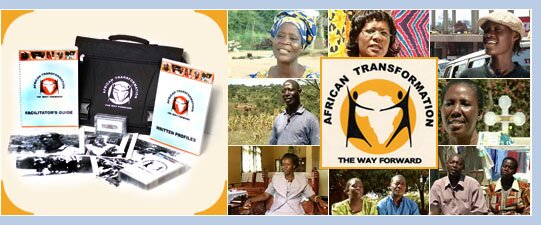 |

|
The purpose of the monthly Spotlight is to showcase health communication materials that have had proven impact.
|
|
 |
AFRICAN TRANSFORMATION - VIDEO PROFILES KIT
African Transformation is a participatory tool that enables men and women to examine gender and social norms, including masculinity, and how they affect their well-being; to overcome gender barriers in their own life: and to work on eliminating harmful gender norms and supporting positive ones. This kit features nine video profiles of women, men, and couples from Tanzania, Uganda, and Zambia who by their actions have become role models in their communities. Their stories feature the challenges they faced and overcame when dealing with issues ranging from traditional and cultural values and reproductive health to violence between partners, networking, and life skills. The video profiles are designed to be used along with the African Transformation Facilitator's Guide, but can also be used as a tool to promote dialogue between men and women. Other components of the kit are photos of the profiled subjects, audio profiles and written profiles. Excerpts of the nine profiles may be viewed by clicking on the photo:
EVIDENCE OF EFFECTIVENESS
African Transformation is an adaptation of the successful Arab Women Speak Out (AWSO) model to the African context. Following a series of Focus Group Discussions in six different African countries that confirmed the AWSO model was appropriate for adaptation to Africa, a Regional Design Workshop was held in January 2004 in Uganda. Participants represented a cross section of specialties, including health, education, domestic violence, eliminating harmful traditional practices, and law. An important outcome of that workshop was the recognition that while AWSO focused exclusively on women, African Transformation would need to engage men in order to be effective. A second regional meeting was therefore held in July 2004 to conceptualize a more comprehensive, inclusive project. Participants included several members of the group that had been selected in January, along with men from five different countries with experience in gender, development, and men’s projects. Then in June 2005 a five-day training of community facilitators was conducted in Uganda. During the training the curriculum was pre-tested together with the video profiles among 27 participants who were all community trainers in different community based organizations. In 2 African Transformation Workshop participants and 224 non-participants were interviewed; preliminary findings include that participants expressed a significantly more equitable view of men’s and women’s roles than was true of non-participants, and male and female participants alike reported talking with a wider range of people about family planning use than did non-participants. Participants were significantly more likely to agree that both men and women can clean, cook, collect water, and shop for household goods compared with non-participants. Holding age, sex, and educational attainment constant, participants were 1.5 times more likely than were their non-participant counterparts to have taken actions related to community improvement.
CREDITS
African Transformation was produced by the Health Communication Partnership, based at Johns Hopkins Bloomberg School of Public Health's Center for Communication Programs, and the Communication for Development Foundation Uganda with funding from the U.S. Agency for International Development.
 See more communication materials about Gender Issues See more communication materials about Gender Issues
Back to M/MC Home
|



